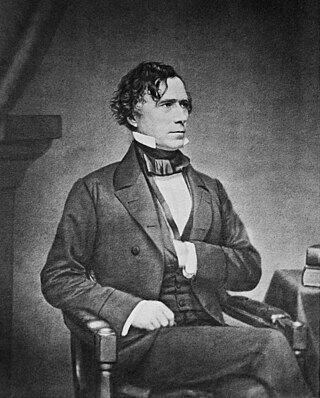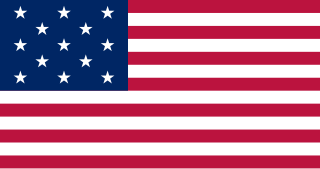
The Articles of Confederation and Perpetual Union was an agreement among the 13 states of the United States, formerly the Thirteen Colonies, that served as the nation's first frame of government. It was debated by the Second Continental Congress at Independence Hall in Philadelphia between July 1776 and November 1777, and finalized by the Congress on November 15, 1777. It came into force on March 1, 1781, after being ratified by all 13 colonial states. A guiding principle of the Articles was the establishment and preservation of the independence and sovereignty of the states. The Articles consciously established a weak confederal government, affording it only those powers the former colonies had recognized as belonging to king and parliament. The document provided clearly written rules for how the states' league of friendship, known as the Perpetual Union, would be organized.

The Kansas–Nebraska Act of 1854 was a territorial organic act that created the territories of Kansas and Nebraska. It was drafted by Democratic Senator Stephen A. Douglas, passed by the 33rd United States Congress, and signed into law by President Franklin Pierce. Douglas introduced the bill intending to open up new lands to develop and facilitate the construction of a transcontinental railroad. However, the Kansas–Nebraska Act effectively repealed the Missouri Compromise of 1820, stoking national tensions over slavery and contributing to a series of armed conflicts known as "Bleeding Kansas."

The Treaty on European Union, commonly known as the Maastricht Treaty, is the foundation treaty of the European Union (EU). Concluded in 1992 between the then-twelve member states of the European Communities, it announced "a new stage in the process of European integration" chiefly in provisions for a shared European citizenship, for the eventual introduction of a single currency, and for common foreign and security policies, and a number of changes to the European institutions and their decision taking procedures, not least a strengthening of the powers of the European Parliament and more majority voting on the Council of Ministers. Although these were seen by many to presage a "federal Europe", key areas remained inter-governmental with national governments collectively taking key decisions. This constitutional debate continued through the negotiation of subsequent treaties, culminating in the 2007 Treaty of Lisbon.

The Continental Congress was a series of legislative bodies, with some executive function, for the Thirteen Colonies of Great Britain in North America, and the newly declared United States before, during, and after the American Revolutionary War. The Continental Congress refers to both the First and Second Congresses of 1774–1781 and at the time, also described the Congress of the Confederation of 1781–1789. The Confederation Congress operated as the first federal government until being replaced following ratification of the U.S. Constitution. Until 1785, the Congress met predominantly at what is today Independence Hall in Philadelphia, though it was relocated temporarily on several occasions during the Revolutionary War and the fall of Philadelphia.

A federation is an entity characterized by a union of partially self-governing provinces, states, or other regions under a federal government (federalism). In a federation, the self-governing status of the component states, as well as the division of power between them and the central government, is constitutionally entrenched and may not be altered by a unilateral decision, neither by the component states nor the federal political body without constitutional amendment.

Bleeding Kansas, Bloody Kansas, or the Border War, was a series of violent civil confrontations in Kansas Territory, and to a lesser extent in western Missouri, between 1854 and 1859. It emerged from a political and ideological debate over the legality of slavery in the proposed state of Kansas.

The Ostend Manifesto, also known as the Ostend Circular, was a document written in 1854 that described the rationale for the United States to purchase Cuba from Spain while implying that the U.S. should declare war if Spain refused. Cuba's annexation had long been a goal of U.S. slaveholding expansionists. At the national level, American leaders had been satisfied to have the island remain in weak Spanish hands so long as it did not pass to a stronger power such as Britain or France. The Ostend Manifesto proposed a shift in foreign policy, justifying the use of force to seize Cuba in the name of national security. It resulted from debates over slavery in the United States, manifest destiny, and the Monroe Doctrine, as slaveholders sought new territory for the expansion of slavery.

Washington's Farewell Address is a letter written by President George Washington as a valedictory to "friends and fellow-citizens" after 20 years of public service to the United States. He wrote it near the end of the second term of his presidency before retiring to his home at Mount Vernon in Virginia.

The presidency of Franklin Pierce began on March 4, 1853, when Franklin Pierce was inaugurated as the 14th President of the United States, and ended on March 4, 1857. Pierce, a Democrat from New Hampshire, took office after defeating Whig Party nominee Winfield Scott in the 1852 presidential election. Seen by fellow Democrats as pleasant and accommodating to all the party's factions, Pierce, then a little-known politician, won the presidential nomination on the 49th ballot of the 1852 Democratic National Convention. His hopes for reelection ended after losing the Democratic nomination at the 1856 Democratic National Convention, and was succeeded by Democrat James Buchanan.

The Confederation period was the era of the United States' history in the 1780s after the American Revolution and prior to the ratification of the United States Constitution. In 1781, the United States ratified the Articles of Confederation and Perpetual Union and prevailed in the Battle of Yorktown, the last major land battle between British and American Continental forces in the American Revolutionary War. American independence was confirmed with the 1783 signing of the Treaty of Paris. The fledgling United States faced several challenges, many of which stemmed from the lack of an effective central government and unified political culture. The period ended in 1789 following the ratification of the United States Constitution, which established a new, more effective, federal government.

Franklin Pierce was the 14th president of the United States, serving from 1853 to 1857. A northern Democrat who believed that the abolitionist movement was a fundamental threat to the nation's unity, he alienated anti-slavery groups by signing the Kansas–Nebraska Act and enforcing the Fugitive Slave Act. Conflict between North and South continued after Pierce's presidency, and, after Abraham Lincoln was elected president in 1860, the Southern states seceded, resulting in the American Civil War.

James Buchanan Jr. was the 15th president of the United States, serving from 1857 to 1861. Buchanan also served as the secretary of state from 1845 to 1849 and represented Pennsylvania in both houses of the U.S. Congress. He was an advocate for states' rights, particularly regarding slavery, and minimized the role of the federal government preceding the American Civil War.
The 1856 State of the Union Address was given by Franklin Pierce, the 14th president of the United States. It was presented to the 34th United States Congress by the Clerk of the United States House of Representatives. He said, "it is necessary only to say that the internal prosperity of the country, its continuous and steady advancement in wealth and population and in private as well as public well-being, attest the wisdom of our institutions and the predominant spirit of intelligence and patriotism which, notwithstanding occasional irregularities of opinion or action resulting from popular freedom, has distinguished and characterized the people of America." He also stated, "In the long series of acts of indirect aggression, the first was the strenuous agitation by citizens of the Northern States, in Congress and out of it, of the question of Negro emancipation in the Southern States." President Pierce supported the Kansas-Nebraska act. This neutralized the issue of slavery in the central states, and did not say whether to allow it or not.
The 1866 State of the Union Address was given by Andrew Johnson, the 17th president of the United States, on Monday, December 3, 1866. This State of the Union was not a spoken address, but a written one. The Reconstruction Era had begun, and Johnson wanted a policy that pardoned the leaders of the Confederate States of America. He began with, "In all of the States civil authority has superseded the coercion of arms, and the people, by their voluntary action, are maintaining their governments in full activity and complete operation." In the middle, he said, "In our efforts to preserve "the unity of government which constitutes as one people" by restoring the States to the condition which they held prior to the rebellion, we should be cautious, lest, having rescued our nation from perils of threatened disintegration, we resort to consolidation, and in the end absolute despotism, as a remedy for the recurrence of similar troubles." The rebellion he is referring to is the American Civil War, which ended in 1865.

The history of U.S. foreign policy from 1829 to 1861 concerns the foreign policy of the United States during the presidential administrations of Andrew Jackson, Martin Van Buren, William Henry Harrison, John Tyler, James K. Polk, Zachary Taylor, Millard Fillmore, Franklin Pierce, and James Buchanan. During this era, the United States annexed the Republic of Texas, acquired the Mexican Cession by defeating Mexico in the Mexican–American War and partitioned Oregon Country with the United Kingdom of Great Britain and Ireland. The period began with the inauguration of Jackson in 1829, while the onset of the American Civil War in 1861 marked the start of the next period in U.S. foreign policy.
The Augusta Declaration, or the Memorial of Augusta County Committee, May 10, 1776, was a statement presented to the Fifth Virginia Convention in Williamsburg, Virginia on May 10, 1776. The Declaration announced the necessity of the Thirteen Colonies to form a permanent and independent union of states and national government separate from Great Britain, with whom the Colonies were at war.
The 1838 State of the Union Address was delivered by the 8th president of the United States Martin Van Buren to the 25th United States Congress on December 3, 1838. Van Buren presented an optimistic view of the nation's state, reflecting on fifty years of federal governance under the U.S. Constitution, which he described as a system preserving both "individual happiness" and "private interests." This year marked the nation’s half-century under the framework devised by the Founding Fathers, which Van Buren credited for the preservation of peace, liberty, and economic growth.
The 1850 State of the Union address was delivered by the 13th president of the United States Millard Fillmore to the 31st United States Congress on December 2, 1850. This was Fillmore's first address after assuming office following the death of President Zachary Taylor. In this speech, he presented his vision for the nation and the principles that would guide his administration. William R. King, the president of the Senate, and Howell Cobb, the Speaker of the United States House of Representatives, presided over the session.
The 1853 State of the Union Address was delivered by the 14th president of the United States, Franklin Pierce, to the 33rd United States Congress on December 5, 1853. This address marked Pierce's first annual message to Congress, emphasizing themes of national prosperity, international relations, and the importance of federal restraint in domestic policy. Pierce opened by celebrating the peace and prosperity the United States was experiencing, calling it "a time of remarkable progress" and "unusual blessings." He emphasized the importance of national integrity and suggested that the nation's success was sustained by the favor of Providence.
The 1854 State of the Union Address was delivered by the 14th president of the United States, Franklin Pierce, to the 33rd United States Congress on December 4, 1854.












